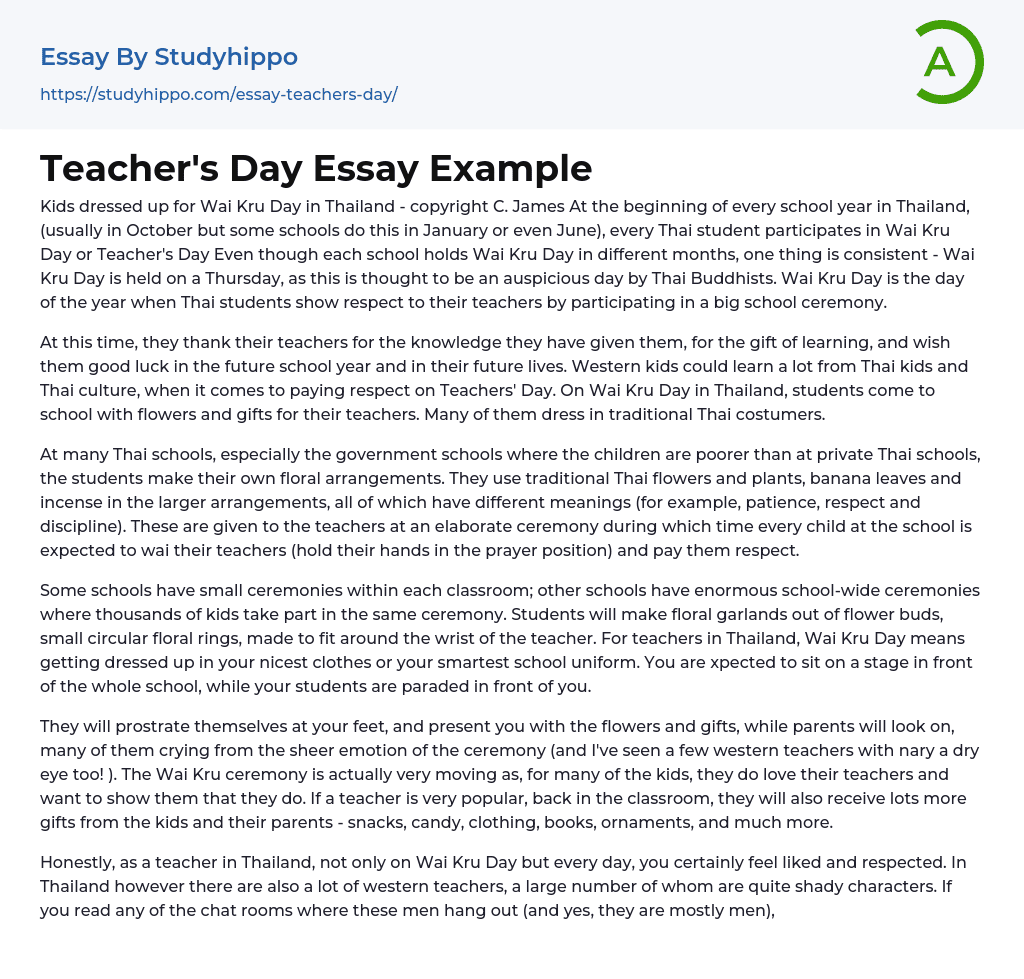In Thailand, the commencement of each school year is symbolized by Thai students taking part in Wai Kru Day or Teacher's Day, an act of reverence towards their educators. The tradition usually kicks off in October but can also be observed in January or June based on the institution's calendar. The day always falls on a Thursday, considered auspicious by Thai Buddhists. Regardless of when it is celebrated across different schools, a lavish ceremony where pupils honor their teachers always marks Wai Kru Day. An included picture showcases kids dressed for Wai Kru Day in Thailand and is under copyright to C. James.
Currently, they extend their gratitude to their instructors for the wisdom imparted, for the opportunity to learn, and send them best wishes for the upcoming academic year and future journeys. Western children could potentially gain significant insights from Thai children
...and their culture regarding demonstrating respect on Teachers' Day. During Thailand's Wai Kru Day, students arrive at school bearing flowers and presents for their educators, with many of them adorned in conventional Thai attire.
In numerous Thai educational institutions, predominantly in government-run schools that cater to less affluent children compared to private Thai schools, the pupils are responsible for creating their unique floral displays. Their compositions use classic Thai flora, banana foliage, and incense in more grand designs, each element symbolic of traits such as patience, respect, and discipline. The end products are presented to their educators in a detailed ritual where every student must demonstrate respect by implementing the wai gesture (holding hands in a prayer-like posture) towards their teachers.
Various schools practice different traditions for
school ceremonies. In some institutions, modest ceremonies are carried out in individual classrooms, while others celebrate on a grand scale with school-wide functions involving thousands of students. In these ceremonies, pupils typically create small floral bracelets from blossoms, designed so that teachers can wear them on their wrists. On Wai Kru Day, a special day for educators in Thailand, they adorn themselves in their most elegant attire or formal school uniform and sit on a platform where the whole school is able to see them as their students take turns to parade in front of them.
The Wai Kru Ceremony is a profound occasion where students demonstrate their respect and affection for their teachers through the presentation of gifts and flowers while humbly bowing at their feet. Witnessing such heartfelt expression of reverence often brings tears to the eyes of spectators, including parents. Even Western educators have been known to be moved to tears by this emotionally stirring event. The ceremony carries significant emotional weight as it provides a genuine platform for pupils to express gratitude towards their mentors. In addition, if a teacher is highly esteemed, they may receive an outpouring of presents in their classroom from both learners and parents; these could vary from food stuffs and sweets to clothing, literature, and decorative items.
Indeed, being an educator in Thailand provides one with consistent feelings of appreciation and respect, not just on Wai Kru Day but every single day. However, there's also a significant presence of Western teachers in Thailand, some of whom have questionable reputations. These individuals, who predominantly identify as males, often criticize the Thai education system and particularly
Wai Kru Day in various online forums they frequent. They deride it as a compulsory day of enforced respect, insisting that the students don't sincerely mean the gestures they perform.
In certain situations, some Western individuals residing in Thailand choose not to participate in the Wai Kru ceremony. Such a decision is often viewed as unwise and could potentially create a negative impression of the Western educator among Thai coworkers, learners, and parents. This action demonstrates a deficiency of cultural comprehension and reverence from some Westerners who act as if their culture is superior to that of Thailand's. However, this is merely an illusion. In fact, if children from the West were taught to demonstrate more honor towards their teachers, it could have a positive influence.
- Classroom essays
- College essays
- E-Learning essays
- Elementary School essays
- Examination essays
- Graduate School essays
- High School essays
- History Of Education essays
- Homeschooling essays
- Kindergarten essays
- Middle School essays
- Public School essays
- School essays
- Single Sex Schools essays
- Special Education essays
- Student essays
- Teacher essays
- University essays
- Vocational Education essays
- Afghanistan essays
- Africa essays
- America essays
- Asia essays
- Australia essays
- Caribbean essays
- City essays
- Developing Country essays
- Dubai essays
- Earthquake essays
- Europe essays
- Fracking essays
- Georgia essays
- Middle East essays
- Natural Disaster essays
- New Zealand essays
- North Korea essays
- South Korea essays
- Thailand essays
- Travel essays




